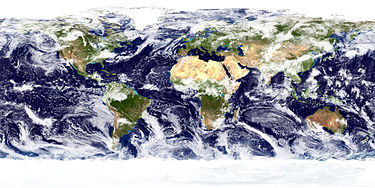Hydrology is the study of the movement, distribution, and quality of water on Earth and other planets, including the hydrologic cycle, water resources and environmental watershed sustainability. A practitioner of hydrology is a hydrologist, working within the fields of earth or environmental science, physical geography, geology or civil and environmental engineering.
Domains of hydrology include hydrometeorology, surface hydrology, hydrogeology, drainage basin management and water quality, where water plays the central role. Oceanography and meteorology are not included because water is only one of many important aspects. Hydrological research can inform environmental engineering, policy and planning.
The central theme of hydrology is the hydrologic cycle, that of water circulating throughout the Earth through different pathways and at different rates. The most vivid image of this is in the evaporation of water from the ocean, which forms clouds. These clouds drift over the land and produce rain. The rainwater flows into lakes, rivers, or aquifers. The water in lakes, rivers, and aquifers then either evaporates back to the atmosphere or eventually flows back to the ocean, completing a cycle. Water changes its state of being several times throughout this cycle.
